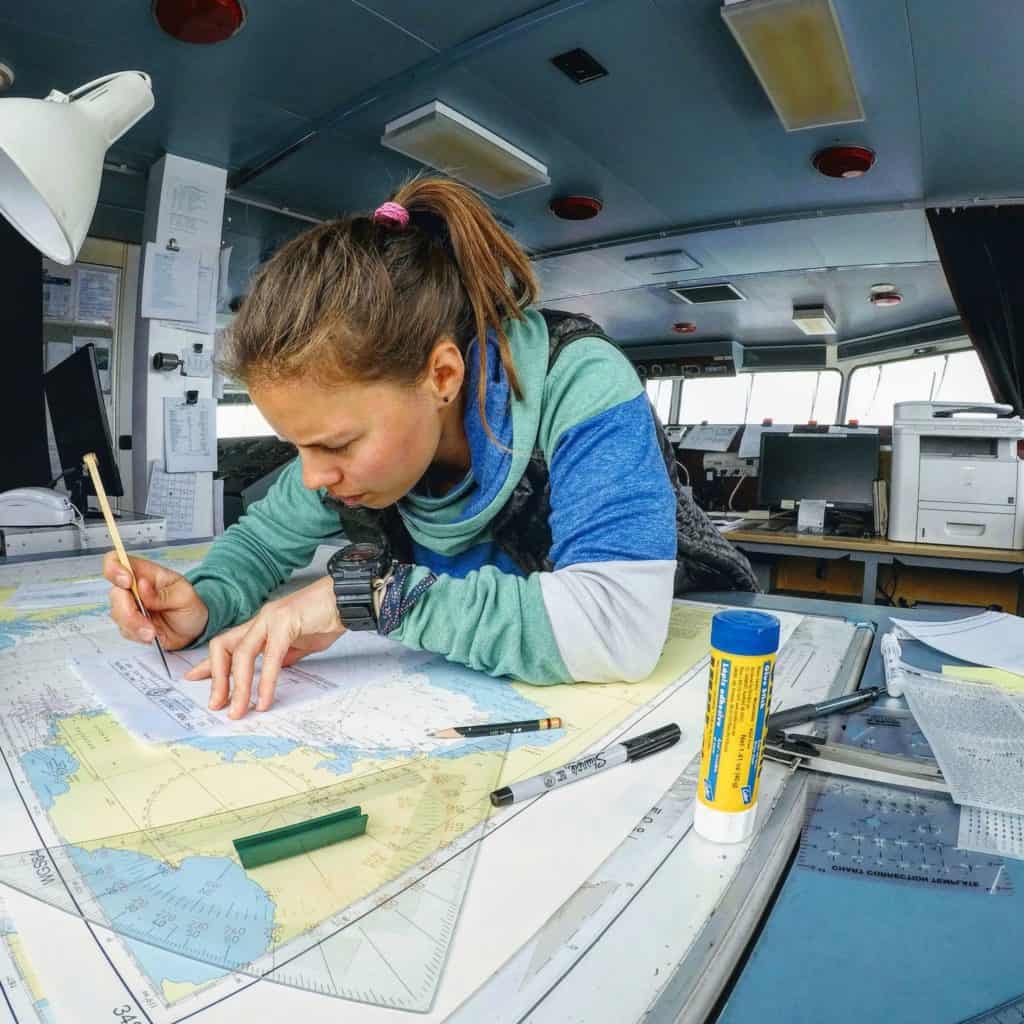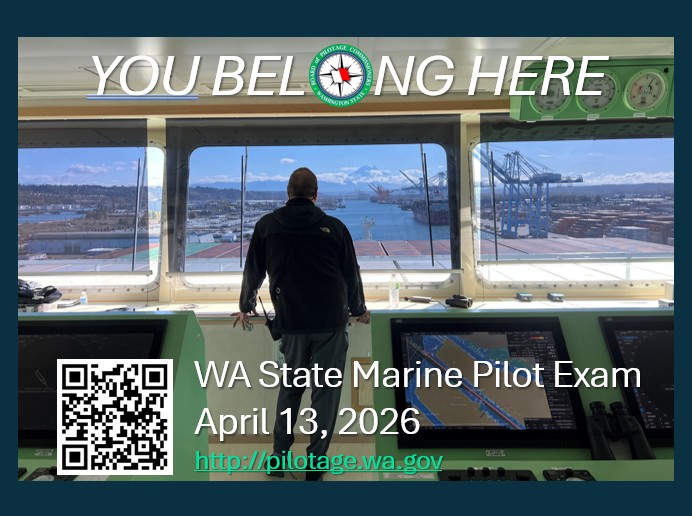If you took the quiz we published and want to become a maritime pilot, it’s time to get into study mode for your upcoming pilot exams!
Below, Captain Amanda Wallace sets you up to be on course!
Are you getting ready to take that pilotage exam? Well, congratulations! Pilotage endorsements are fantastic advantages to have on your license. Here are a couple of study tips that can help you fight those distractions and get into that elusive ‘study mode.’
- Schedule That Exam! This will help you set goals and make time for studying. Remember, you can always reschedule if you need more time. Find your Regional Exam Center here!
- Location, Location, Location! Pick a study location that works best for you. If being home is too distracting, try going to the library or renting a hotel room close to the exam center.
Usually a convenient time to study for these exams is on vacation, which can be tough to manage. My friends and family understood when I told them I was studying that I couldn’t hang out all the time. I allowed myself to have some fun, but didn’t over do it, so that I could be ready to study the next day.
- Successful Study Materials. Get yourself set up with the latest corrected Print-On-Demand nautical charts. Get as many test chart copies as you can; 10 is a good number. The exam center should have information on how to get these. Make sure that you are all stocked up on things like printer paper, ink, and chart plotting tools, so that you don’t run out of supplies while you are on a roll!
Let us give you a leg up with a few essential resources and downloads:
Light List | US Coast Pilots | Print On Demand Charts

- Daunting Details on Chaotic Charts. The crucial details on charts can be incredibly daunting. Divide up the chart into sections and create copies of your own. Repetition works well here. Create notes on flash cards as a study aid. They come in different colors that can help you organize your notes. You can have a friend or family member quiz you!
- Get Insight and Zero In. Reach out to a friends or co-workers that have taken the exam before. Maybe they can help give you an idea of what to focus on. Read the requirements thoroughly, make sure you are including the correct things on the chart and studying the right material.
- Study Buddy. Is there someone that is taking the exam at the same time you are? Studying together can really help with motivation.
- Take a Break! Taking multiple breaks can help you stay focused and retain information. You can set a timer for your break time if needed. Leave your cell phone in another room or put it on silent. You can check it during your break time!
- Exercise. Incorporating exercise into your study routine can help you retain information, stay focused, and most importantly, reduce stress.
- Grease vs. Greens. Find something healthy and quick, and stock up on your favorites. When you aren’t thinking about what to eat, you will have more time to study more effectively.
- Timing Is Everything. Find the time of day that works best for you. Some people are more focused in the morning versus the evening. Playing music or podcasts in the background can help make studying more fun. Try out that playlist or the latest podcast series!
- The Aftermath. After your exam, take some well-deserved time for yourself to take pride in your incredible accomplishment. Then, pay it forward. Take some notes so that you can pass along helpful tips to the next woman that reaches out to you. Also, these notes could help with other pilotage endorsements that you may take!
There are plenty of study techniques, but find what works best for you.
Leave a comment below with your favourite study methods, tips and tricks!
Pictured above is Madeleine Wolczko. Special thanks to Madeleine for use of her photos.








Here’s my advice for taking any pilot group written exam:
1. Consider forming a study group of 1-2 other folks that you get along with and trust.
a) I was in a group of 2 other people and we three agreed that we would approach the exam as a team with our goal to finish 1, 2 & 3, and truly didn’t care who got which place, just wanted to help each other get to the top three.
b) This may seem altruistic and perhaps not even competitively-minded, but the reality is that we each had different strengths, and together we were much stronger than we would have been as individuals. The three of us did get placed 1, 2 and 3, and we were each asked to start training immediately.
2. Approach the written exam and simulator exam as two separate events. The written exam is your first hurdle, and you should be concentrating on that for now.
3. The written exam may not be hard, per se, but it will be a LOT. Because of the massive amount of information that could be on the exam, you need to develop a study strategy.
a) If you don’t already have the books listed in exam notice bibliography, get them.
b) Invest in some sort of exam building software. I purchased, for $12, the Multiple Choice version of the Schoolhouse Technologies Test Maker and found it to be excellent, but it only runs on Windows. If you find something different, or need something that runs on iOS, make sure the software can tag, label or somehow differentiate the category of the question.
4. Start creating your own exam questions, one chapter at a time. By the time my study group finished going through the entire bibliography, we had created around almost a thousand test questions. There was literally nothing on the exam that I hadn’t either created a question about, or seen one that was created by a study partner.
a) Take a book from the bibliography and if you are in a group, divide up the chapters evenly and start creating multiple choice exam questions. If you are on your own, no worries, just start creating questions one chapter at a time. Categorize and label every question so that you can create a customized exam of only that type of question, regardless of which text it came from.
b) Create multiple choice exam questions for every single subject / definition / highlighted term / theory in the book. Don’t half ass this. Let me repeat this: Do NOT half ass this! Creating a good exam question with reasonable “distractors” is the key to gaining an understanding of the topic.
c) Bad exam question vs. good.
Here is a sample question, with BAD distractors:
At low speed, _____________ is responsible for most of the underwater resistance met by the vessel. (Hooyer pg. 10)
a. frictional resistance
b. lack of steering
c. change in pivot point
d. none of the above
Even without studying, you probably can guess the answer. That is BAD. You do not want to be able to guess correctly.
Here is the same question, with GOOD distractors:
At low speed, _____________ is responsible for most of the underwater resistance met by the vessel. (Hooyer pg. 10)
a. frictional resistance
b. hydraulic pressure
c. viscosity static pressure
d. inertia
A little harder to pick out the correct answer, isn’t it? That is GOOD.
This is an important point that I need to emphasize. You must really, really understand something to create a good question with good distractors. This strategy forces you to dig into the topic and understand it on many levels. Also, imagine it is 3 months after you created the exam question and you are now in the review phase. If you TRULY understand the topic, you should be able to pick the right answer, but if you have forgotten or never understood it to begin with, you should NOT necessarily be able to guess correctly. If you get it wrong on a practice test, it is easy to see that you need to go back and study that topic again.
d) OK, breathe. Don’t be overwhelmed by this. Eat the elephant one bite at a time. Also, keep your eye on the prize. Getting into a pilot organization SHOULD be hard. It is the pinnacle of our profession and deserves to be hard. But you can do this. (Hell, I did it and I am a hawsepiper with zero formal maritime education. I wasn’t the smartest person in the room on exam day, but I made sure I had been the hardest working.)
e) I know what else you are thinking. “Why can’t I use flashcards instead of creating a bazillion test questions?” Well, you can if you prefer, just put the same thoughtful intensity into it. The reason I personally like exam questions (and the reason it was so successful for us) is that you can tag, label and categorize the questions. We created many, many custom exams with the software. Feeling a little weak on just one part of shiphandling theory? Create an exam with just questions about pivot point in shallow water at slow speeds. Feeling pretty ready and just want to practice a random 100 question exam? No problem, the software can do that, too.
5. Get together with your study group a couple of times a month to go over complicated theories and to assign new bibliography chapters for exam creation. Remember, the more you put into it, the better the results.
And my most important piece of advice: take breaks, get outside, and breathe.